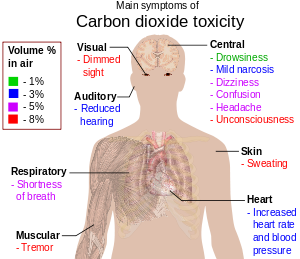
Back فرط ثنائي أكسيد الكربون في الدم Arabic Гіперкапнія Byelorussian Хиперкапния Bulgarian Hiperkapnija BS Hipercàpnia Catalan Hyperkapnie German Hiperkapnio Esperanto Hipercapnia Spanish هیپرکاپنی Persian Hyperkapnia Finnish
This article may be too technical for most readers to understand. (September 2019) |
| Hypercapnia | |
|---|---|
| Other names | Hypercarbia, CO2 retention, carbon dioxide poisoning |
 | |
| Main symptoms of carbon dioxide toxicity, by increasing volume percent in air.[1][2] | |
| Specialty | Pulmonology, critical care medicine |
Hypercapnia (from the Greek hyper, "above" or "too much" and kapnos, "smoke"), also known as hypercarbia and CO2 retention, is a condition of abnormally elevated carbon dioxide (CO2) levels in the blood. Carbon dioxide is a gaseous product of the body's metabolism and is normally expelled through the lungs. Carbon dioxide may accumulate in any condition that causes hypoventilation, a reduction of alveolar ventilation (the clearance of air from the small sacs of the lung where gas exchange takes place) as well as resulting from inhalation of CO2. Inability of the lungs to clear carbon dioxide, or inhalation of elevated levels of CO2, leads to respiratory acidosis. Eventually the body compensates for the raised acidity by retaining alkali in the kidneys, a process known as "metabolic compensation".
Acute hypercapnia is called acute hypercapnic respiratory failure (AHRF) and is a medical emergency as it generally occurs in the context of acute illness. Chronic hypercapnia, where metabolic compensation is usually present, may cause symptoms but is not generally an emergency. Depending on the scenario both forms of hypercapnia may be treated with medication, with mask-based non-invasive ventilation or with mechanical ventilation.
Hypercapnia is a hazard of underwater diving associated with breath-hold diving, scuba diving, particularly on rebreathers, and deep diving where it is associated with increased breathing gas density due to the high ambient pressure.[3][4][5]
- ^ Cite error: The named reference
friedmanwas invoked but never defined (see the help page). - ^ Cite error: The named reference
AMSAwas invoked but never defined (see the help page). - ^ Cite error: The named reference
Anthony and Mitchell 2016was invoked but never defined (see the help page). - ^ Cite error: The named reference
AD0725851was invoked but never defined (see the help page). - ^ Cite error: The named reference
Mitchell 2008was invoked but never defined (see the help page).